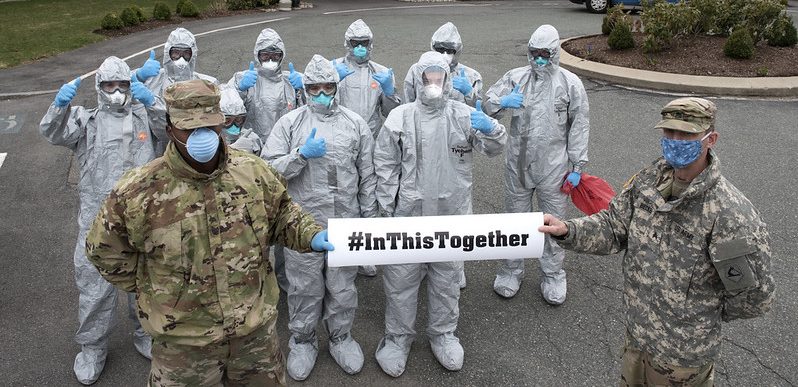We’re familiar with the role of government during normal times. What can be harder to see and appreciate is all that government workers do for people when crisis strikes.
During the coronavirus pandemic, employees of government agencies at the local, state, and federal levels are exceeding their traditional missions. They are saving lives and making life more manageable during these trying times.
Here are just some of the many unexpected ways government employees are doing all they can for communities.
3D printing to the rescue
Dr. Beth Ripley, a radiologist at Veterans Affairs Puget Sound Health Care System, has been sharing behind-the-scenes tweets about projects to test and refine 3D-printed medical supplies for COVID-19 response. The cross-sector collaborators are using social media to connect with people who can contribute insights on everything from material safety to a recipe for synthetic blood. Less than a month after the project began, VHA Innovation Ecosystem was able to release its first 3D-printed face mask design meeting Food and Drug Administration regulatory standards for backup personal protective equipment (PPE).
After 10 long days, our 3D printed mask is almost ready for production! Thank you to our governmental brothers and sisters, as well as academic and industry partners. @US_FDA @NIH3Dprint @VAPugetSound @DeptVetAffairs @VHAInnovation @UWMedicine @3dsystems James Coburn: model pic.twitter.com/LYmXV3V5ll
— Beth Ripley, MD PhD (@bethannripley) April 1, 2020
A case of the warm fuzzies
Many animal care and control agencies have had to close to the public and tell volunteers to stay home, which means staff are called on to do more than ever. They’ve adapted quickly, doing virtual pet adoption matching, expanding animal fostering to clear kennel space, and finding all new ways to help their community. The Richmond, Virginia, Animal Care and Control has come up with a creative way to look out for their furry, scaly, and even human neighbors. It has started a food pantry “to help anyone struggling financially to feed their pets or themselves.” Donations have poured in.
https://www.facebook.com/Richmond.Animal.Care.and.Control/photos/a.728801013797563/4030940653583566/
Always ready, always there
In communities across the country, the National Guard is stepping up to serve. Troops are being mobilized to strengthen local humanitarian responses to the pandemic in ways different from typical missions. They’re building temporary medical facilities, assisting with COVID-19 testing, delivering urgently-needed medical supplies, answering calls to coronavirus helplines, supporting overwhelmed food banks and more. They’re providing this support all while operating under highly unusual social distancing and safety protocols.
Our Airmen from the @146AirliftWing taking care of Californians! https://t.co/oD7syftofg
— The California National Guard (@CalGuard) March 29, 2020
Turning out so others can vote
Once it was decided that Wisconsin would hold in-person elections (let’s leave aside whether voting during the pandemic should take place by mail-in ballot), it was up to poll workers to make sure people could exercise their right to vote. Government election staff were joined by volunteers, National Guard members, police officers, firefighters, and medical professionals who together ran an election under unprecedented circumstances.
These are some of the precautions Wisconsin voters and poll workers are taking as people cast their ballots (📸: Scott Olson/Getty Images, Derek R. Henkle / AFP, Dan Reiland/The Eau Claire Leader-Telegram via AP) pic.twitter.com/TbErsbLnMd
— BuzzFeed News (@BuzzFeedNews) April 7, 2020
Keeping infrastructure ducks in a row
The first person in the U.S. to die of coronavirus was in King County, Washington, and the area has been hit hard. During the pandemic, government workers throughout the county have been on the front lines of the community’s response. Others continue to work behind the scenes to maintain essential government services. They are keeping tap water flowing, toilets flushing, public transit running, roads safe and storm drains clear.
A big thanks to all our Kirkland Public Works crew members that are working hard to make sure critical infrastructure (e.g. clean drinking water) is maintained during the COVID-19 pandemic. Also, they still managed to take the time to save these ducklings. Our crews are the best! pic.twitter.com/M3CvZCuUJd
— Kirkland, Washington (@kirklandgov) April 3, 2020
Weathering the storm
Emergency testing and treatment facilities are popping up in unusual places, such as parking lots, public parks, convention centers, sports stadiums, and fairgrounds. These field centers are temporary facilities, sometimes housed under a solid roof, but oftentimes under event tents that may not withstand extreme weather. That’s where the National Weather Service staff comes in, sending special forecasts to emergency managers and public safety officials as part of its Impact Decision Support Services (IDSS). With this kind of timely weather advice, field center staff can better decide how to continue to provide medical care and keep the public safe.
Also, I never in my life would’ve expected a weather-warning text to include specific calls to outdoor #COVID19 testing sites. Great job of #IDSS by @NWSMKX. pic.twitter.com/73g5bCqDUH
— Clark Evans (@ClarkEvansWx) April 7, 2020
How you can help
There’s a lot you can do to help your neighbors and community during this pandemic. Fill out the Census, foster a pet from your local animal shelter, donate blood, or join a mutual aid network. If you’re financially able, donate money to your local food bank or to support restaurant workers. Volunteer for a remote citizen science project that is working on the coronavirus problem, such as Foldit or Folding@Home.
Help government respond to COVID-19 by checking if your state or local government needs volunteers (for example, here are the volunteer opportunities in California, Illinois, and North Carolina). Or, volunteer for U.S. Digital Response project or request its assistance for your agency.
Most importantly, if your community has issued a shelter-in-place order and your job is not essential, keep yourself and others safe by staying home.
Photo Credit: Massachusetts National Guard
Lauren Girardin is a marketing and communications consultant, storyteller, and freelance writer based in San Francisco. She helps organizations engage their communities and tell their stories. Her website is laurengirardin.com and you can connect with her on Twitter at @girardinl.





Leave a Reply
You must be logged in to post a comment.